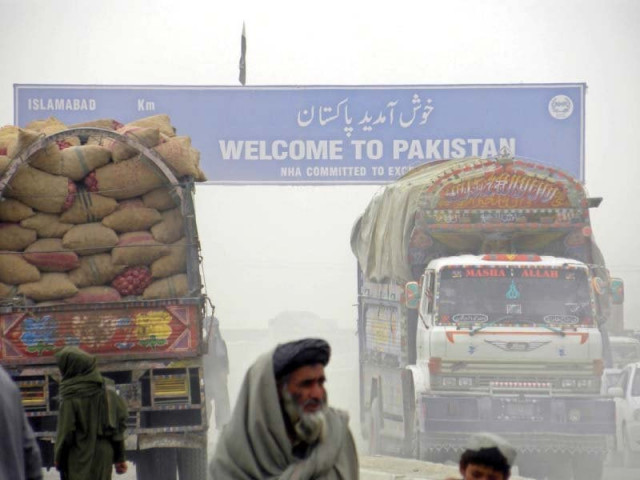Govt suffers losses as documents go unchecked at Pak-Afghan border
Corrupt customs officials refrain from verifying phytosanitary certificates before clearing goods for export

A senior customs official revealed that apart from tax evasion, the officers also allowed violation of import and export rules. PHOTO: FILE
According to sources, corrupt customs officials do not verify phytosanitary certificates to facilitate tax evasion in the export of goods through the Pakistan-Afghanistan border. To this end, blank certificates are issued to truck drivers carrying fruits from Pakistan to Uzbekistan and Tajikistan via Afghanistan.
They added that the blank certificates were issued in Bhalwal, Sargodha, which were later filled somewhere in Khyber-Pakhtunkhwa (K-P).
A phytosanitary certificate is issued by the Ministry of National Food Security and Research and carries required details of imported goods, including the origin of export, fitness for human consumption and details of the truck as well as the truckers. Drivers must carry the certificate during transit through Afghanistan to other central Asian countries.
“One has to verify the certificates in Pakistan and pay the duty if the goods are being taken to Tajikistan and Uzbekistan via Afghanistan. However, certain customs officials deliberately refrain from verifying the documents to evade duty, thus, causing losses of billions of rupees to the national exchequer,” a senior customs official dealing with the matter told The Express Tribune.
The official, who requested anonymity since he was not authorised to speak to the media, stated that the certificates must be verified by the customs appraisement so that remittances could be documented and transferred through proper banking channels.
He added that the certificates were intentionally not verified in Pakistan and were instead verified in Afghanistan, where Afghan customs officials were told that the goods were being transported outside of their country. The practice also allows exporters to save taxes in Afghanistan too.
“Taxes are evaded both in Pakistan and Afghanistan but interestingly the goods never reach Tajikistan or Uzbekistan and are instead sold in Afghanistan,” the official revealed, adding that this malpractice caused huge losses to Pakistani exports.
Sources revealed that the certificate was the only way to verify who was importing the goods and where they were going.
“If the process is properly monitored, the trade volume could jump up to $10 billion, which is five times higher than the current volume of $2 billion,” a source said.
Officials also raised objection pertaining to the small volume of remittances coming to Pakistan from Tajikistan and Uzbekistan as compared to the huge number of certificates being issued to the drivers.
“The certificates are issued for Tajikistan and Uzbekistan but the goods never reach there,” the official claimed. “Even if the goods reach Tajikistan and Uzbekistan, the volume of remittances from the two countries is too low in comparison to the number of certificates issued. This shows the authorities’ negligent attitude towards the serious issue and how the practice has continued unabated.”
The official also said the trade deficit could be reduced by more than 40% if the certificates were properly issued and verified, which would allow remittances into Pakistan through official channels.
The senior customs official also revealed that apart from tax evasion, the officers also allowed the violation of import and export rules.
He said despite global prohibition on the use of wooden crates for the export of edibles, Pakistani fruits were still being transported across the border in wooden crates.
The Express Tribune tried to contact officials of the Collectorate of Customs Appraisement in Peshawar as well as officials of the Ministry of National Food Security in Islamabad, but they could not be reached for their official version on the developments.
Published in The Express Tribune, January 16th, 2020.
Like Business on Facebook, follow @TribuneBiz on Twitter to stay informed and join in the conversation.



















COMMENTS
Comments are moderated and generally will be posted if they are on-topic and not abusive.
For more information, please see our Comments FAQ